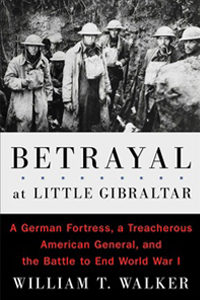WILLIAM WALKER taught at the University of New Orleans and Lamar University, and served as associate vice president for public affairs at Virginia Tech, Gettysburg College, and the College of William and Mary. After a 40-year career in academia, he now lectures on World War I, leads battlefield tours to France, and teaches a course on the conflict at the University of Virginia. He lives in Staunton, Virginia. His book is Betrayal at Little Gibraltar: A German Fortress, a Treacherous American General, and the Battle to End WWI. Walker’s article “Mystery at Montfaucon” appears in the Spring 2017 issue of MHQ.
 1. How did you first become interested in military history?
1. How did you first become interested in military history?
I grew up in Knoxville, Tennessee, a town steeped in Civil War history. When I was still a boy, I began to roam the earthworks surrounding the city. Those entrenchments immediately captured my attention, and well before I was ten, I began to visit libraries to build my understanding of the Battle of Knoxville. That experience started my lifelong journey through the field of military history.
2. Why did you decide to write about this particular topic?
While researching the death of a relative in World War I, I discovered an affidavit written by a veteran of the Meuse-Argonne Offensive charging a leading American general with disobeying an important order. I tried to put the charge out of my mind, because I had heard too many old soldiers’ tales that ultimately proved to be misleading. I was quite skeptical. But as I explored the incident, I found more and more documentary evidence of a betrayal and cover-up that led me to write the book.
3. Betrayal at Little Gibraltar is your first book. Do you have any advice for aspiring authors?
My advice is to write, write, and write some more. Write every day, and rewrite obsessively. Although Betrayal is my first book, I have spent my lifetime writing—news releases, feature articles, op-ed pieces, video scripts, and fund-raising publications. As slight as some of these documents now seem, every word, every sentence, helped prepare me for the complex task of writing a book. Writing kept my brain engaged and my fingers moving.
4. Do you have any other suggested readings for those interested in America’s involvement in World War I?
The books of Margaret MacMillan on the beginning of the Great War and the Paris Peace Conference are superb, as are the works of Edward Lengel on the American experience in the conflict.
5. What is your favorite book on military history?
May I mention several books? The World War II trilogy by Cornelius Ryan is excellent, as is Evan Connell’s Son of the Morning Star about Custer. These books feature strong narrative lines and deep human interest, as well as solid military analysis. William Manchester’s Goodbye Darkness about the Pacific war and Rick Atkinson’s books on the American army in World War II Europe are also very powerful.
6. What’s next for you? Are you working on anything else?
Over the course of my career in the academic world, I collected a number of promising stories that I am now exploring. One is about the 30th Division in World War I; others are more personal in nature. We will see what develops. MHQ





